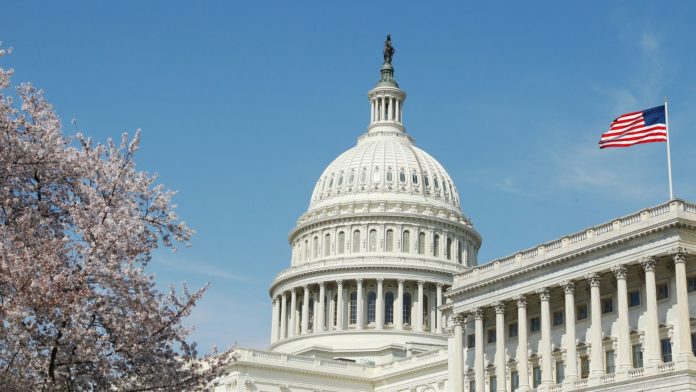At a time when the entire country seems to be at odds, and every topic is incredibly polarizing, one thing is for sure: elections matter.
The right to vote is a fundamental part of being a citizen of this country, and we all need to do our part to stay informed, involved, and actively make our voice heard through our vote. And yes, that includes midterm elections.
While many people might reserve their political involvement for presidential elections and only cast their vote every four years when we elect a commander in chief, now more than ever, midterm elections are crucial.
In 2022 a lot is riding on various midterm races as local governments and elected officials from coast to coast will impact the fate of this nation in the present, immediate future, and future generations.
But the sad reality is that many people, especially young voters (we’re looking at you, millennials), do not vote in midterm elections.
According to Pew Research, only 42 percent of eligible millennials voted in the 2018 midterm elections. Yes, they did outvote older generations for the first time. In fact, younger voters, ages 18 to 53, cast 62.2 million votes, compared with 60.1 million cast by Baby Boomers and older generations. But still, we could all do better. And this year, it will matter more than ever before.
What are Midterm Elections?
Every four years, there is a presidential election where American citizens vote for the next leader (and their administration) of the United States of America. At the halfway point in that president’s term, two years after election day, they are appropriately named midterm elections. And while presidential elections often draw the greatest voting numbers and the most weight (and press) worldwide, midterm elections can have just as much of an impact on the country’s direction and those in positions of power.
Think of midterm elections as a temperature check for the current administration and the broader political landscape of the country. They are an opportunity for American voters to re-assess the government leaders and elect, or re-elect, representatives who can keep the president’s agenda in check.
This year’s midterm elections will take place on November 8th, 2022, with some states offering vote-by-mail and early voting beginning in October. But before the actual midterm election, there are, of course, primaries that start as early as March 1st and continue for months, with the busiest times being June and August.
Why Do Midterms Matter?
First of all, all elections matter. From your kids’ school PTA elections to local government to midterm elections and presidential races, they all matter because they are a chance to make your voice heard and weigh in on who will represent your values on crucial issues.
Midterm elections specifically are very important, and this year more than ever, they will play a significant role in determining how the country is run and how President Biden and his administration are able to deliver on their political promises.
A lot has happened in the years since the last midterm elections and even since President Biden was elected.
In 2018, every sign indicated that Democrats would win big in a blue wave that would take back the Senate, but now that is reversed, and most indicators point to a series of Republican wins.
In 2017, before the last midterms, President Trump’s approval rating was only 37 percent — the lowest of any first-term president (ever) after 11 months in office. Now Biden isn’t doing much better, with an average approval rating of 42 percent.
The 2022 elections will really put Trump’s influence over the Republican party to the test. If Trump’s endorsement of a candidate proves to be essential and influential, it will demonstrate that Trump still has a hold over the GOP, a big indicator of how things might pan out in 2024 when the next presidential election occurs.
In addition, Republicans have made it abundantly clear that they plan to take back the House and win back the Senate in 2022. Currently, Democrats hold power over both the House of Representatives, with Democrats holding a narrow majority, and the Senate, which is evenly split between 50 Democrats and 50 Republicans, but Vice President Kamala Harris is the tiebreaker.
In addition to winning the House and Senate, many Republicans and Donald Trump are on a mission to unseat every Republican who voted to impeach him last year.
And on top of everything, there are also threats to democracy to consider, such as the issues of voter rights, voting access, redistricting, and gerrymandering, all of which are being hotly debated on both sides of the aisle. Redistricting is when states draw new congressional district boundaries to account for the 2020 Census and population changes. Gerrymandering is when redistricting involves boundaries drawn to influence who gets elected. It’s happening right now, and the Republican party might be able to pick up five seats and take over the House majority by doing nothing more than redrawing state congressional maps.
If your head is spinning, we get it. Needless to say, what happens in the upcoming midterm elections will be incredibly important and will leave a lasting impact that will not only matter now but for the next two years and going into the 2024 Presidential election.
What Issues Matter Most in the 2022 Midterms?
According to recent data from a Long Island University Steven S. Hornstein Center for Policy, Polling, and Analysis national poll, in the 2022 midterm elections, the two issues voters are most concerned about are the economy (27%) and coronavirus (17%). Not shocking. The next most common issues reported were health care (13%), national security (11%), climate change (10%), immigration (7%), racial/gender equality (6%), supreme court (4%), education (3%), and foreign policy (3%).
That said, the most important issues differed for the different political parties. Republicans listed their top two issues as the economy (37%) and national security (25%). For Democrats, the top issues were coronavirus (22%) and the economy (20%), with healthcare not far behind (18%).
And in terms of the coronavirus and the administration’s response to the pandemic, expect to hear a lot about mask and vaccine mandates, at-home testing and test availability, and how the government is preparing for future variants and other pandemics.
This topic will come into play with differing narratives on both sides of the political spectrum. Democrats will try to position themselves as the responsible party doing whatever it takes to (hopefully successfully) end this global health crisis, and Republicans will position mandates as government overreach that will hurt the economy.
Furthermore, across the board, voters are confused, worn out by the pandemic, and looking to leadership for what’s next. A recent Kaiser Family Foundation poll found that more than 58 percent of participants felt “frustrated” about the status of Covid vaccinations, and 25 percent said they were “confused,” according to the New York Times.
Races to Watch in 2022
Clearly, a lot will be going on during the midterm elections, beginning with the primaries and carrying through all the way to November. So, which races should you watch? Which battles matter most? The list is long, but here are a few key races to watch.
Georgia
Many experts consider Georgia to be “ground zero” for the 2022 midterm elections. It’s always been a battleground state, but it’s tracking to be the most high-profile and significant state regarding the governor’s race and Senate races.
This is mainly because of the Democratic victory in the 2020 presidential election, when Georgia voters turned out, leading to Biden’s win of the state’s electoral votes — the first time a Democrat won the state since 1992 — and when Sen. Warnock and Sen. Jon Ossoff both triumphed in a pair of runoff elections in January, which secured control of the Senate to Democrats.
The governor’s race should be intense, with several high-profile Republicans potentially running against the current Governor Brian Kemp (R), who barely beat out Stacey Abrams in the 2018 race for governor. And with Abrams recently announcing she’ll run again, it’s practically guaranteed to be a crucially important race that will impact the entire country.
While Democrats took over in 2020, their current hold seems to be fragile, and it would be a huge blow to lose either the governor’s race or a senate seat. And the redistricting going on in Georgia will most likely hand the GOP another seat in the House, so every vote is important.
The Battle to Control the House of Representatives
In 2018, Democrats won the House of Representatives by a narrow margin, currently holding the majority of house seats. But all 435 seats are up for election (members of the House of Representatives are chosen every two years, with elections held on each even year) in 2022, so the stakes are high.
On top of that, redistricting has created seven more Democratic-leaning seats nationally, one more Republican-leaning seat, and six fewer highly competitive seats.
It seems this redistricting combined with Biden’s sinking approval rating gives Republicans a decent advantage for the 2022 House races.
Senate Races
In the 2022 midterm elections, 34 of the 100 Senate seats are currently up for grabs. While not all of those are predicted to be super competitive, many will be tight races with a far-reaching impact.
In Arizona, Democratic Senator Mark Kelly (who won a special election to fill the seat previously held by John McCain) is seeking a full term. We already talked about Georgia, but clearly, Democrats are extremely focused on the re-election of Senator Raphael Warnock and Senator Jon Ossoff and are hoping that Stacey Abrams’s campaign could help boost their prospects.
In Florida, Senator Marco Rubio is seeking a third term, and he’ll face off against Democratic representative Val B. Demings, who raised more funds than him (think $13 million!) in 2021.
In North Carolina, Senator Richard Burr, who voted to impeach President Trump, is stepping down, and several Republicans are waiting to take his place, some of who Trump has endorsed. Again, this will be an opportunity to see just how influential Trump’s support will be for conservative voters.
In Nevada, the first Latina senator, Catherine Cortez Masto, a granddaughter of Mexican immigrants, is up for re-election. In 2016 Cortez Masto won her groundbreaking victory by rallying Latinos against Trump’s plan to build a border wall. Now she’ll face off against Adam Laxalt, a former Nevada attorney general, who has Trump’s support and the endorsement of Senate Minority Leader Mitch McConnell.
The open-seat senate race in Pennsylvania got interesting when Dr. Mehmet Oz (cardiothoracic surgeon and TV personality) announced he was jumping into the race as a conservative Republican who can “cure what’s wrong with Washington.” He joins a long list of candidates to replace Senator Patrick J. Toomey, a big Trump critic, who is retiring.
This list of races to watch is by no means all-encompassing, but it’s a good place to start as we keep an eye on competitive primaries, intense campaigns, and political showdowns that will deeply impact the state of the nation for years to come.
Stay informed, stay up to date, stay active, and remember your vote matters.
For Image credit or remove please email for immediate removal - info@belatina.com








































